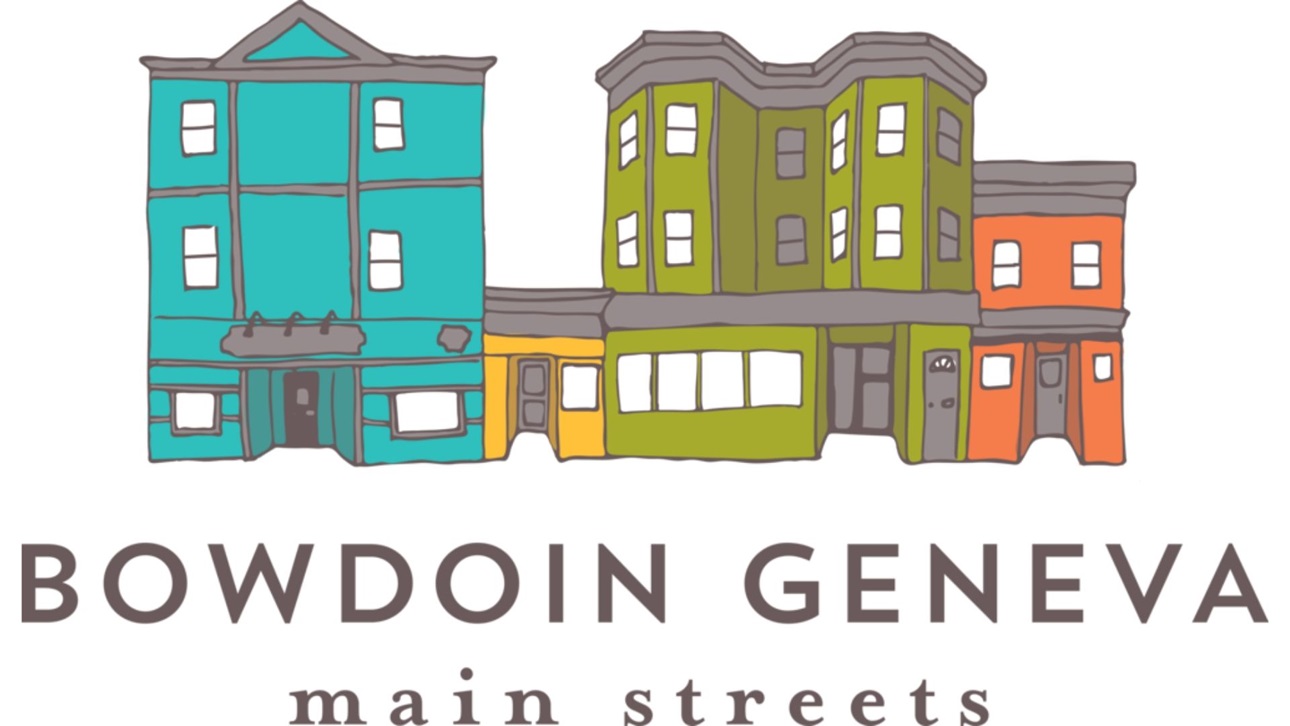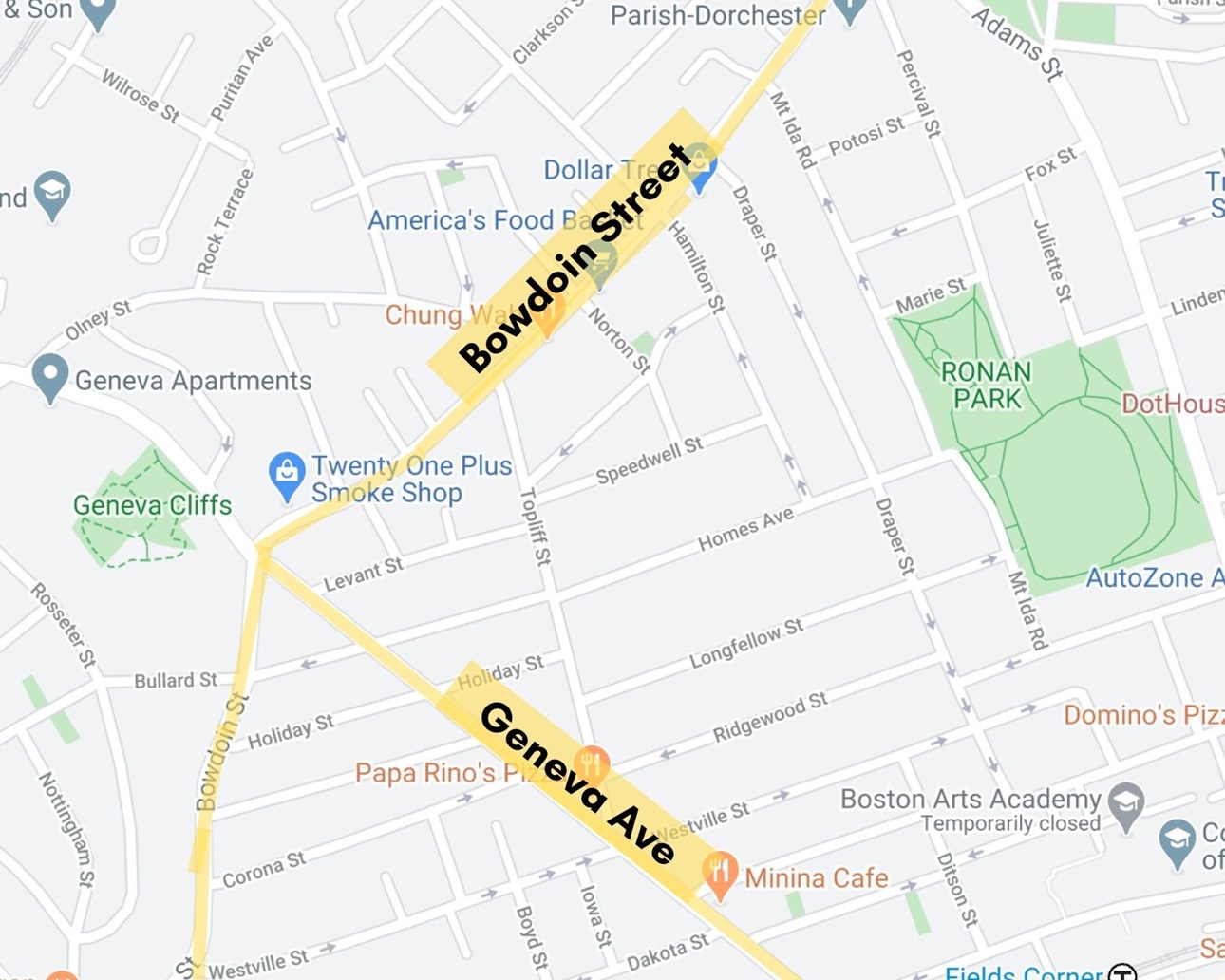Bowdoin-Geneva Main Streets: Essential Work That Keeps a Neighborhood Humming
You might think that with “nonessential” businesses closed, a Main Streets coordinator would find herself with some thumb-twiddling time. Not so—unless we’re counting the thumb-action involved in all-hours texting and emailing with neighborhood business owners and residents trying to survive and plan their next steps.
Bowdoin-Geneva Main Streets (BGMS) Executive Director Tania Anderson says things are beyond hectic these days. BGMS serves a neighborhood that is 90 percent immigrant and/or people of color. Many of the local businesses are family enterprises working on the narrow margin of viability even in ordinary times.
Owing to some antique zoning regulations, the types of businesses allowed in the Dorchester area between Bowdoin Street and Geneva Avenue are limited. Today the vast majority of commercial storefronts are salons, barbershops and electronics repair, with a handful of bodegas and small cafes. For the last two months, only about a dozen of the area’s 75 businesses have been open. But that doesn’t mean they aren’t busy.
Business owners are contacting BGMS with countless questions about how to adapt to the short- and long-term situation: How do I get on Uber Eats? How can I set up my own delivery? What’s involved in curbside pick-up? Where do I get masks? How do I apply for a zoning variance to start a new enterprise?
“A lot have reached out,” says Anderson. “One big challenge is that I’m a relatively new ED, and updating our contact lists had been one of those we’ll-get-to-it-soon things and hadn’t been a priority. I’ve realized how important it is to keep lists up to date! It’s especially tough here because privacy is a concern for immigrant communities, and many folks won’t give their cell phone number. And now a lot of landlines have been disconnected and old emails aren’t checked.”
But Anderson is as optimistic as she is energetic. Her main objectives for Bowdoin Geneva Main Streets through this crisis include getting people to fill out as many relief fund forms as possible: “Apply to everything!” She’s also helping vendors by phone or through video to explore different ideas to revitalize their shops or to market a new delivery service. She’s been working with some to update their online presence (social media in nearly all cases); promoting quarantine-focused practices (such as adapting menus); making sure everyone has the latest info and even counseling folks on financial budgeting. “That’s super important,” she says, “because a lot of our community members are so used to just surviving, receiving a lump sum can be hard to manage.”
She has also met with people in person—cautiously—because she does a lot of translating. Getting from English (especially the English of the IRS or a bank) into Spanish, Portuguese and
Cape Verde Creole isn’t easy over the phone. She says, “Interpreting [documents] not just linguistically but culturally has been a time-consuming task.” But essential, because many are seeing this as a moment of opportunity, and seeking loans to open a business.
Anderson points to Ana Semedo, who owns the successful Cape Verde Taste restaurant on Geneva Ave. She wants to open a second location on Bowdoin Street. “If you can think of anything bad that could happen to a person, it’s happened to her. But she is self-made, coming through it all and starting her restaurant with only her savings. It’s grown so much in the last couple of years, she wants to add another, buffet-style restaurant. She’s an immigrant who’s been here 20 years, but doesn’t speak English super well because all she does is work. Her daughter has now graduated from college with a B.A. in business. You can see that opportunity for growth, for the American dream.”
The work of BGMS has always been supporting this kind of development. Semedo is a success story. But when you see where most people are, there is so much work to do, Anderson observes. “And when a pandemic hits, you see marginalized communities are suffering most and likely to suffer further. This has been an eye-opener to where my community is. Also heart-breaking. You see the opportunity… How can we grab it? I look at everything and ask how can we make it better, even festive… how can we make money?”
Will all that be easier or more challenging post-COVID? Anderson believes it’ll be easier to convince people that funding entrepreneurs and adjusting zoning restrictions will help revitalize the area. The BGMS vision is to make the district a hub for Afrocentric arts and entertainment. “We’ll do it one artist, one contractor, one business owner at a time.”
Bowdoin-Geneva Main Streets (BGMS) Executive Director Tania Anderson says things are beyond hectic these days. BGMS serves a neighborhood that is 90 percent immigrant and/or people of color. Many of the local businesses are family enterprises working on the narrow margin of viability even in ordinary times.
Owing to some antique zoning regulations, the types of businesses allowed in the Dorchester area between Bowdoin Street and Geneva Avenue are limited. Today the vast majority of commercial storefronts are salons, barbershops and electronics repair, with a handful of bodegas and small cafes. For the last two months, only about a dozen of the area’s 75 businesses have been open. But that doesn’t mean they aren’t busy.
Business owners are contacting BGMS with countless questions about how to adapt to the short- and long-term situation: How do I get on Uber Eats? How can I set up my own delivery? What’s involved in curbside pick-up? Where do I get masks? How do I apply for a zoning variance to start a new enterprise?
“A lot have reached out,” says Anderson. “One big challenge is that I’m a relatively new ED, and updating our contact lists had been one of those we’ll-get-to-it-soon things and hadn’t been a priority. I’ve realized how important it is to keep lists up to date! It’s especially tough here because privacy is a concern for immigrant communities, and many folks won’t give their cell phone number. And now a lot of landlines have been disconnected and old emails aren’t checked.”
But Anderson is as optimistic as she is energetic. Her main objectives for Bowdoin Geneva Main Streets through this crisis include getting people to fill out as many relief fund forms as possible: “Apply to everything!” She’s also helping vendors by phone or through video to explore different ideas to revitalize their shops or to market a new delivery service. She’s been working with some to update their online presence (social media in nearly all cases); promoting quarantine-focused practices (such as adapting menus); making sure everyone has the latest info and even counseling folks on financial budgeting. “That’s super important,” she says, “because a lot of our community members are so used to just surviving, receiving a lump sum can be hard to manage.”
She has also met with people in person—cautiously—because she does a lot of translating. Getting from English (especially the English of the IRS or a bank) into Spanish, Portuguese and
Cape Verde Creole isn’t easy over the phone. She says, “Interpreting [documents] not just linguistically but culturally has been a time-consuming task.” But essential, because many are seeing this as a moment of opportunity, and seeking loans to open a business.
Anderson points to Ana Semedo, who owns the successful Cape Verde Taste restaurant on Geneva Ave. She wants to open a second location on Bowdoin Street. “If you can think of anything bad that could happen to a person, it’s happened to her. But she is self-made, coming through it all and starting her restaurant with only her savings. It’s grown so much in the last couple of years, she wants to add another, buffet-style restaurant. She’s an immigrant who’s been here 20 years, but doesn’t speak English super well because all she does is work. Her daughter has now graduated from college with a B.A. in business. You can see that opportunity for growth, for the American dream.”
The work of BGMS has always been supporting this kind of development. Semedo is a success story. But when you see where most people are, there is so much work to do, Anderson observes. “And when a pandemic hits, you see marginalized communities are suffering most and likely to suffer further. This has been an eye-opener to where my community is. Also heart-breaking. You see the opportunity… How can we grab it? I look at everything and ask how can we make it better, even festive… how can we make money?”
Will all that be easier or more challenging post-COVID? Anderson believes it’ll be easier to convince people that funding entrepreneurs and adjusting zoning restrictions will help revitalize the area. The BGMS vision is to make the district a hub for Afrocentric arts and entertainment. “We’ll do it one artist, one contractor, one business owner at a time.”


